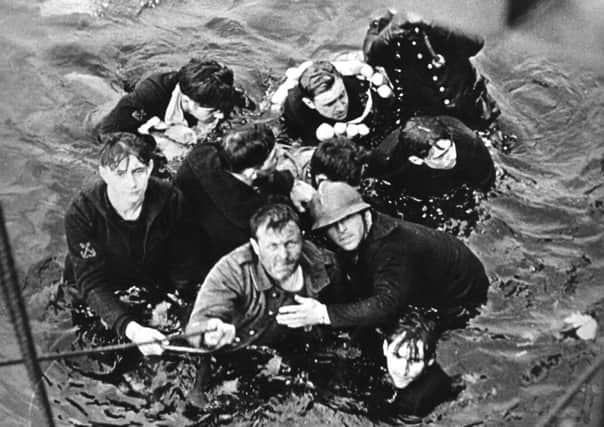Lori Anderson: Why the miracle of Dunkirk moves me to tears


“Why don’t you tell them about Dunkirk, for all the kids listening.” I’m not quite sure what made me stop my morning administrations, sit down on the bed and properly listen as Chris Evans introduced Sally Hutchinson the proud owner of the Chumley. I wasn’t a kid and I wasn’t entirely ignorant of Dunkirk, I knew it to be a French port and the scene of, well, something during the Second World War, but, like most of the population, I wasn’t likely to enter Mastermind with ‘Operation Dynamo’ as my chosen subject. Yet as Sally Hutchinson explained the role played by her little boat, Chumley, I could feel a lump well up in my throat and tears begin to drizzle down my cheeks.
Alongside hundreds of similar small vessels, the Chumley and her crew had answered the government’s call to rescue British troops stranded on the beaches of northern France, who were under ferocious attack from the German army and air force.
Advertisement
Hide AdAdvertisement
Hide AdThe idea of ordinary people, ‘little people’ in ‘little ships’, sailing into a hurricane of violence and destruction, setting aside their own safety and intent only on saving as many soldiers as they could, was deeply moving. I was overwhelmed by pathos and what came to mind were the words of the anthropologist Margaret Mead: “Never doubt that a small group of thoughtful, committed citizens can change the world: indeed, it’s the only thing that ever has.”
Until the short segment on last week’s episode of The Chris Evan’s Breakfast Show on Radio 2, I’d been unaware of Christopher Nolan’s new movie, Dunkirk; when I watched the trailer later that day I blubbed some more: especially at the film’s heart piercing tagline: ‘When 400,000 men couldn’t get home. Home came for them.” This weekend I’ve made plans to go to the cinema for the first time in years, accompanied, of course, by a wheelbarrow of Kleenex.
I have also spent the last few days educating myself on what is known as ‘the Miracle of Dunkirk’ and what I’ve learned has only strengthened my conviction of the wisdom of Margaret Mead’s words. For if it wasn’t for the resolve of those day sailors we would be living in a very different world. There are certain axes on which world events swing and Dunkirk was such a fulcrum. The British Expeditionary Force had been sent to France after the German invasion of Poland, they were later caught unawares by the speed and ferocity of the Nazi ‘Blitzkreig’ that swept through Belgium and the Netherlands and soon found themselves surrounded and trapped, pressed up against the coastal port of Dunkirk.
It is deeply moving to read the testimony of veterans of Dunkirk as they speak about the rank smell of death that rose up from the town, daily bombardment having littered the street with corpses. Between 26 May and 4 June what became known as Operation Dynamo unfolded, which was the evacuation of 380,000 soldiers by an armada of Royal Navy destroyers, pleasure crafts and hundreds of little boats. The waters were so shallow that the little boats were used to ferry soldiers out to the destroyers in deeper waters but even once aboard the troops were far from safe. HMS Wakeful, a destroyer, was 12 miles out to sea, practically in sight of home, when it was dive bombed by German Stukas and then torpedoed. She broke in two pieces and sank with six hundred men onboard. The sole survivor was a soldier who was on deck smoking a cigarette at the time of the attack.
I think it’s worth pausing for a minute to reflect on what would have been the most likely outcome if the ‘Miracle of Dunkirk’ had not come to pass. If Winston Churchill’s original estimate had proved correct and only 30,000 of the 400,000 men had been rescued and the remainder captured, Britain would have had little choice but to sue for peace with Hitler. The Second World War could have been won by the Nazis.
The more one reads about Dunkirk the more miraculous was our salvation. The German army’s advance was, foolishly, stopped at a crucial point on the orders of Hitler who had been persuaded by Herman Goering, head of the German Air Force that his planes and not the army’s tanks, should have the ‘honour’ of destroying the British army, a decision which bought us something more crucial than ammunition: time.
The heart of the story of Dunkirk is not the soldiers in uniform, incredibly moving though their plight and suffering was, for rightly or wrongly we expect heroism from men in khaki. What moved me to tears and I imagine many others, is the notion of civilians, ordinary people, untrained in the art of combat, untested in a crucible of conflict, setting out through treacherous waters to save their fellow man. It was the right kind of tribalism, a unity designed not to cast others out but to save lives and bring our soldiers home. During those dark days at Dunkirk, the crew of the Chumley, as Sally Hutchinson explained to Chris Evans’ listeners, selflesly set their own safety aside to rescue hundreds of soldiers.
When I settle down this weekend in the dark to watch Christopher Nolan’s Dunkirk unspool on to the cinema screen, I think that what myself and many others will be doing is more than just watching a movie. In a small way, 77 years on, we will be paying tribute to our fellow countrymen for their crucial role in what we now know was an act of national salvation. After Dunkirk, Winston Churchill reminded the nation that victory is not won by retreats, but it was ultimately won by the courage of those ordinary sailors that helped us all live to fight another day.